Article 86: The role of coffee in ancient to modern medicine
Coffee is a popular beverage wherever it is found, having a far-reaching impact on many important areas of human history, including medicine.
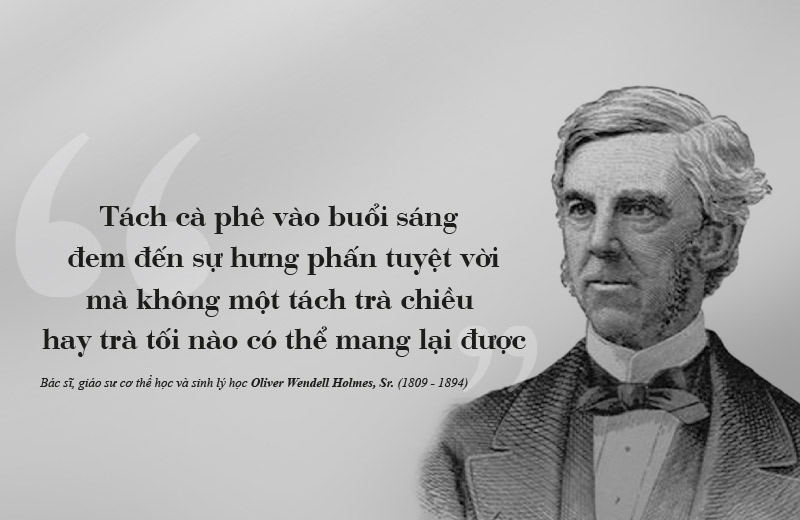
“The morning cup of coffee has an exhilaration about it which the cheering influence of the afternoon or evening cup of tea cannot be expected to reproduce.” – Doctor and professor of anatomy and physiology Oliver Wendell Holmes Sr. (1809 – 1894
A valuable medicinal herb for health
As soon as it was discovered in the 9th century in Ethiopia, coffee was considered a gift from God to bring alertness and clarity to the user. Until coffee spread, popularized throughout the Muslim world by the expansion of the Ottoman Empire in the 16th-17th centuries, and continued to conquer Europe in the 17th-18th centuries, this drink has always been considered an elixir, a special energy source that enhances health, stimulates human intellectual development, and cures several diseases.
Before the year 1000, members of the Ethiopian Galla tribe were grinding ripe coffee berries, mixed with animal fat to create an energy food for the body. In 1100, Arab traders brought coffee to grow in Yemen and quickly discovered its special use. They boiled coffee with water into an invigorating medicine for the body, stimulating alertness and concentration.
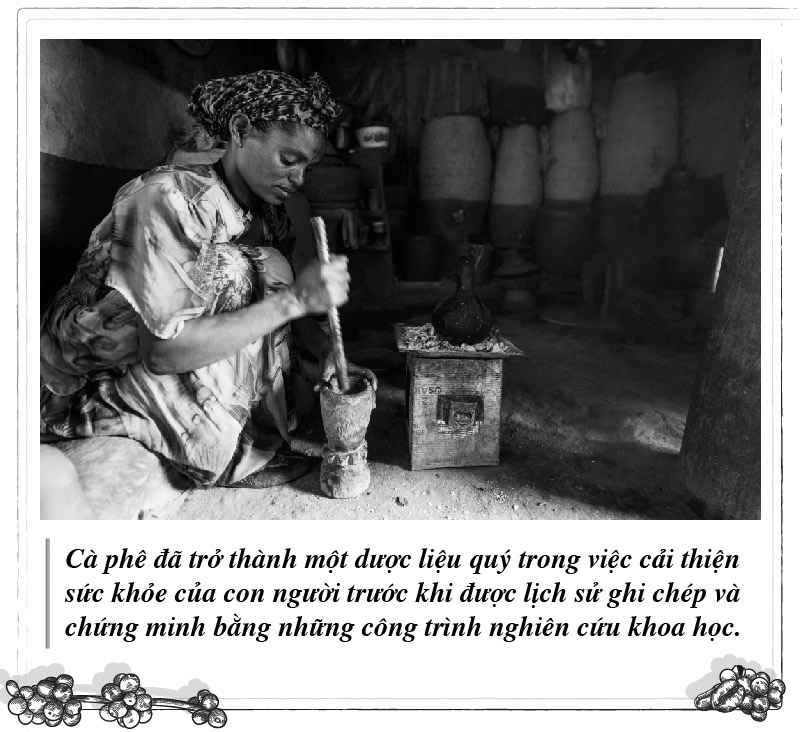
Coffee had become a valuable medicine in improving human health before it was recorded and proven by scientific studies.
In 1025, the great physician Avicenna wrote the Canon of Medicine – the first book to acknowledge coffee as a potential therapeutic modality as a medicine. Also, from here, the uses, benefits, and medical properties of coffee for health have been widely studied. In the 16th century, the physician Prospero Alpini and his associates attempted to describe the health effects of coffee. Many heated debates about the effects of coffee have taken place. Some doctors recognize the drink as having a warming effect, and others recognize coffee as a diuretic, which can dry out certain liquids.
In Europe, coffee first appeared as a drug sold in pharmacies. Meanwhile, useful knowledge about coffee with health was known through the research papers of the Mediterranean explorers. In the book Rauwolf’s Travels by the famous doctor, botanist Leonhard Rauwolf (German) published in 1582 after he traveled to Syria and was impressed by the drink known by the natives as Chaube, he wrote: “They have a very nice drink called chaube that is almost as black as ink and very good in disease, especially stomach ailment.” In 1592, doctor, professor of botany Prospero Alpini (Italian) published De Plantis Aegypti, which mentioned many pharmacological properties of coffee for human health. In 1687, Nicolas de Blegny, a physician and pharmacist under King Louis XIV of France, wrote a book on how to use coffee, tea and chocolate “the right way” to cure diseases.
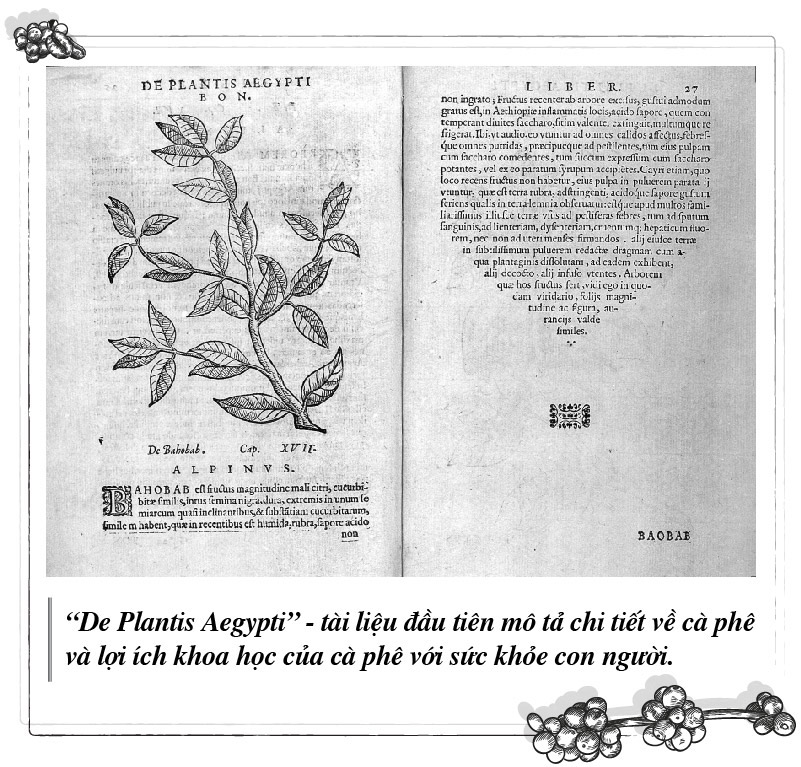
“De Plantis Aegypti” – the first document to detail and describe coffee and its scientific benefits to human health.
The discoveries of special properties of coffee have also been applied by the Chinese in traditional medicine. Coffee was then combined with other herbs to make pills for people suffering from anxiety, arrhythmia, or insomnia. In Japan, the beneficial medicinal effects of coffee were mentioned by Professor Yamamoto in the books Komo Honzou (1783), Hirokawa (1795), Kosei Shimpen (1811).
The special energy source for body and mind
Over the centuries, coffee has pervaded strongly and occupied an increasingly important place in human society. The properties and values of the materials contained in coffee are therefore always interested in research. However, it was not until 1819, for the first time that the work of the German chemist Friedlieb Ferdinand Runge (1794-1867) discovered an important component of caffeine in coffee. This is a scientific discovery of great significance, clarifying the special medicinal properties of coffee, opening the way to decipher the mystery of the attractiveness of this drink, as well as the pharmacological value of coffee for application in modern medicine.
In his book Hauswirtschaftlichen Briefen, Runge recounts the special encounter that opened the door to this enormous discovery. Accordingly, Runge impressed the great writer Johann Wolfgang von Goethe (1749 – 1832) with his scientific experiment and was given a bag of rare Arabic mocha coffee beans by Goethe as an expression of his gratitude, with words of encouragement to study this seed. “He gave me a box of coffee beans, which a Greek sent him as a delicacy. ‘You can also use them in your studies,’ says Goethe. He was right; because I soon found out there was caffeine in it.”
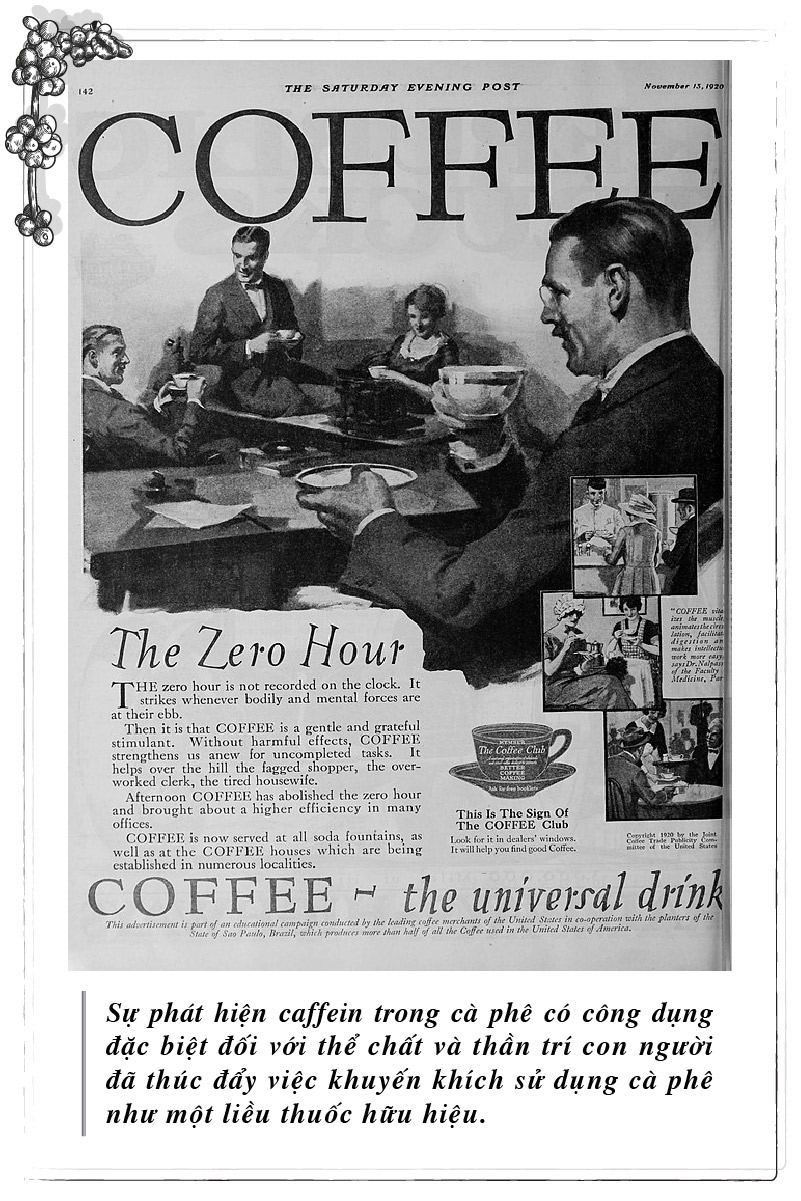
The discovery that caffeine in coffee has special effects on the human body and mind has prompted the promotion of the use of coffee as an effective drug.
Runge’s work inspired many scientists to continue to explore the active ingredients in coffee throughout the 19th century and beyond. In 1895, German chemist Hermann Emil Fischer (1852-1919) first synthesized caffeine from its chemical components. This was important research that helped Fischer win the Nobel Prize in 1902, and helped people understand the exact mechanism of caffeine. By 1912, research by American physiologist Horatio Wood (1841 – 1920) showed that caffeine has the effect of promoting muscle energy by stimulating the reflex centers of the nervous system. According to Wood, “Caffeine not only enhances the strength of muscle contractions but also allows the body to function more efficiently with the same amount of energy expenditure.” Another study in 1925 by Rudolf Allers (1883 – 1963) – Austrian neurologist, member of the first group that founded psychoanalysis, and Edith Freund continued to show that coffee is the source of energy for the brain, no less than for the muscle, by the effect of caffeine in coffee on the nervous system. With the main ingredient caffeine, studies have gradually deciphered the most basic and valuable attribute of coffee, which is its stimulant properties, affecting the brain, central nervous system (CNS), heart and muscles. Therefore, coffee helps to elevate mood, delay fatigue, and increase performance in both mental and physical work.
Along with the discovery of caffeine, scientists also discovered that there are thousands of different chemicals in coffee, including carbohydrates, lipids, nitrogenous compounds, vitamins, minerals, alkaloids and phenolic compounds. These ingredients not only contribute to the unique taste of coffee but also contain positive physiological effects on human health and mind.
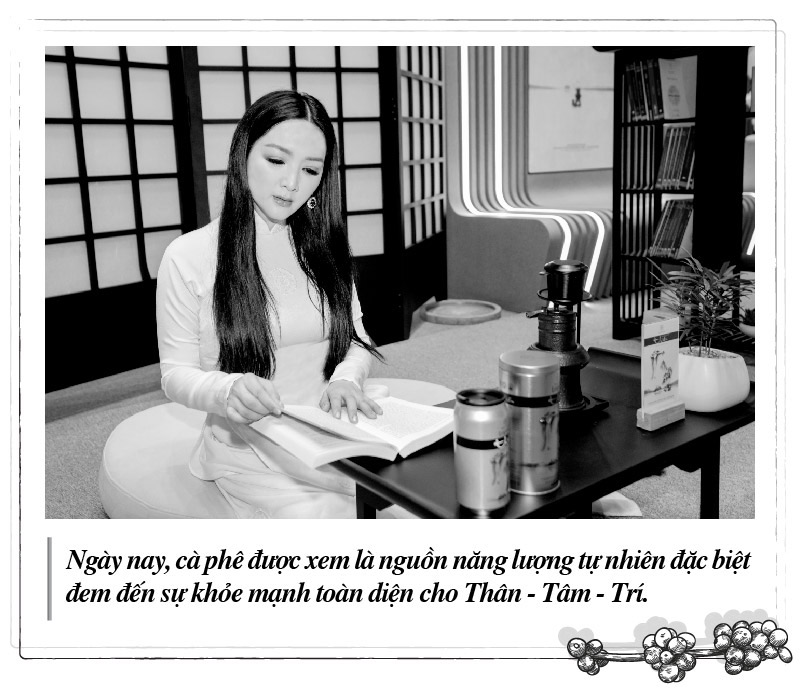
Today, coffee is considered a special natural energy source that brings comprehensive health to Body-Spirit-Mind.
As soon as it was discovered more than 1200 years ago, as well as the first occurrences on most continents, coffee was considered a medicinal herb, before becoming a drink and occupying an important position in human society. Along with the discovery of caffeine and other medicinal ingredients of coffee, during the past 40 years, more than 8000 medical research works have been carried out by scientists with in-depth analysis, to prove that coffee is a natural energy source, providing comprehensive care for Body – Spirit – Mind. This continues to open up new studies being carried out continuously in the 21st century on the application of coffee as a remedy, a natural source of energy, especially used in therapies to enhance care and protection for the human body and mind. As the number 1 coffee brand, with many years of research into the history and culture of coffee of humanity, Trung Nguyen Legend considers coffee a source of awakening energy, the elixir for the brain – the elixir for creativity. Through a different and special product – model – project system, Trung Nguyen Legend is gradually forming a comprehensive coffee ecosystem, contributing to building a new lifestyle, coffee lifestyle – successful lifestyle – mindful lifestyle that brings comprehensive wealth and happiness in Body – Spirit – Mind to the community.
Readers are cordially invited to watch the series of Coffee Tao videos posted on https://bit.ly/caphetrietdao
THE REAL COFFEE
ROASTED ONLY FOR PEOPLE OF WISDOM!
Source: “The Philosophical Way of Coffee” – copyright by Trung Nguyen Legend
Coming up: Avicenna Bukhara – Coffee boosts energy and mental strength


